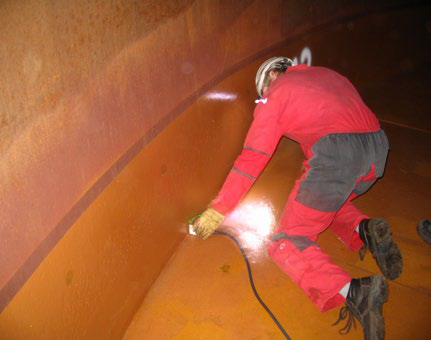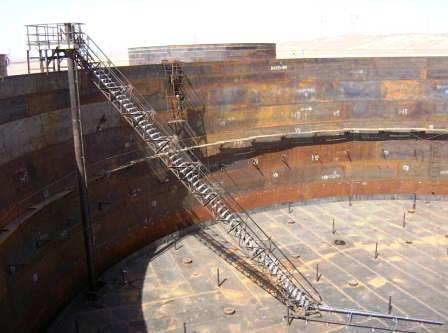The Importance of Specialist Tank Welding Inspection Providers
The Importance of Specialist Tank Welding Inspection Providers
Blog Article

Recognizing the Significance of Rigorous Storage Tank Welding Inspection Processes in Averting Failings and Enhancing Life-span
In the realm of commercial procedures, the importance of extensive container welding assessment processes can not be overemphasized. By carrying out numerous evaluation methodologies, companies can identify defects early, consequently staying clear of costly effects and extending the life of their storage space tanks.
Relevance of Welding Inspections
Identifying the essential duty of welding inspections in preserving structural honesty, these procedures guarantee that welds fulfill recognized standards and requirements - Tank Welding Inspection. Efficient welding examinations are paramount in the building and construction and maintenance of tanks, as they straight impact the toughness and safety of the frameworks. By recognizing possible deficiencies, such as incorrect methods or material defects, inspections mitigate the risk of catastrophic failures
Welding evaluations encompass different methodologies, consisting of visual evaluations, non-destructive testing (NDT), and analyses of welding procedures. Each method serves to verify the quality and compliance of welds with sector policies, therefore safeguarding both personnel and environmental rate of interests. Additionally, normal inspections cultivate a society of accountability and excellence within the workforce, ensuring that all employee stick to ideal techniques.
Moreover, these examinations contribute to the overall lifecycle management of storage tanks by determining wear or degradation early at the same time. By attending to these concerns proactively, companies can prolong the operational life expectancy of their properties, eventually causing set you back financial savings and improved integrity. In recap, the relevance of welding examinations can not be overemphasized; they are vital for ensuring safety, longevity, and conformity in tank building and maintenance.
Typical Reasons For Storage Tank Failings
Understanding the common root causes of storage tank failings is necessary for avoiding tragic events and making certain the durability of storage space systems. One widespread reason of container failure is deterioration, which can considerably deteriorate the structural integrity of storage tanks over time. Environmental variables, such as exposure to dampness, chemicals, and temperature changes, can accelerate this procedure.
An additional crucial factor is inappropriate welding methods, which may bring about flaws like cracks or insufficient joints. These problems can endanger the storage tank's toughness and lead to leaks or tears. Furthermore, poor maintenance techniques can cause undetected wear and tear, inevitably boosting the danger of failure.
Design imperfections, consisting of poor thickness or bad material selection, can also add to tank vulnerabilities. Moreover, functional factors, such as overfilling or exposure to severe pressures, can strain the tank past its designated restrictions.
Key Inspection Techniques
Effective examination strategies play an important duty in mitigating the risks linked with container failings. A thorough approach to container welding examination entails several essential techniques, each designed to investigate this site recognize prospective problems and guarantee architectural stability.
Visual inspection stays the initial line of defense, allowing assessors to recognize surface abnormalities such as fractures, rust, or imbalance. This strategy is frequently supplemented by non-destructive screening (NDT) techniques, which are important for evaluating weld quality without endangering the storage tank's integrity.

Additionally, magnetic bit testing (MPT) and color penetrant testing (DPT) work for spotting surface area flaws in ferromagnetic materials and non-porous surfaces, specifically. Each technique has its toughness and limitations; consequently, a mix of methods is frequently used to achieve comprehensive assessment results.
Advantages of Extensive Evaluations
While the prompt prices of extensive inspections may seem daunting, the lasting benefits considerably outweigh these preliminary financial investments. Implementing detailed evaluation processes not only enhances the integrity and safety of tank structures however additionally minimizes the threat of devastating failures that can lead to significant economic losses and ecological injury.
Extensive examinations help recognize prospective concerns early in the welding procedure, enabling timely rehabilitative actions that avoid expensive repair services or replacements down the line. This positive approach cultivates a society of quality control, where adherence to finest methods comes to be implanted in operational procedures. Regular examinations contribute to increased possession long life, as they ensure that tanks remain in ideal problem throughout their life expectancy.
On top of that, the paperwork produced from these evaluations acts as a useful source for upkeep planning and efficiency examinations. This data-driven technique can additionally improve operational performance, resulting in minimized downtime and enhanced productivity. Eventually, strenuous inspections not just safeguard the structural stability of storage tanks yet also give substantial economic benefits, enhancing the notion that purchasing top quality guarantee is a wise decision for any company associated with storage tank procedures.
Regulatory Criteria and Compliance
Governing criteria and compliance are vital elements of tank welding evaluation procedures, as they develop the structure for ensuring safety and security Your Domain Name and top quality in procedures. Compliance with these standards not only alleviates risks but also improves the total honesty of welded structures. Numerous organizations, consisting of the American Culture of Mechanical Engineers (ASME) and the American Oil Institute (API), provide standards that dictate acceptable techniques for welding, inspection, and testing.
These requirements mandate making use of certified employees, the execution of rigorous assessment procedures, and adherence to particular welding treatments. By straightening with regulative demands, companies can ensure that their containers fulfill the required security and efficiency criteria, thus decreasing the possibility of catastrophic failures that can result in substantial financial losses and ecological damage.

Moreover, regulatory compliance promotes a culture of liability and continuous enhancement within the welding and construction sectors (Tank Welding Inspection). Routine audits and assessments make sure that techniques remain straightened with advancing standards, thus promoting lasting integrity and operational efficiency. Inevitably, adherence to regulative requirements not only protects assets but additionally improves the life expectancy of welded tanks, guaranteeing they offer their desired function effectively in time
Conclusion
Finally, strenuous storage tank welding inspection procedures play an essential function in stopping failures and expanding the life-span of storage frameworks. By identifying potential shortages with various inspection strategies, companies can minimize threats connected with storage tank stability. The execution of these examinations promotes a culture of top quality assurance, leading to enhanced property durability, reduced upkeep expenses, and boosted functional effectiveness. Sticking to governing requirements further emphasizes the significance of these evaluations in maintaining security and integrity within the industry.
Report this page